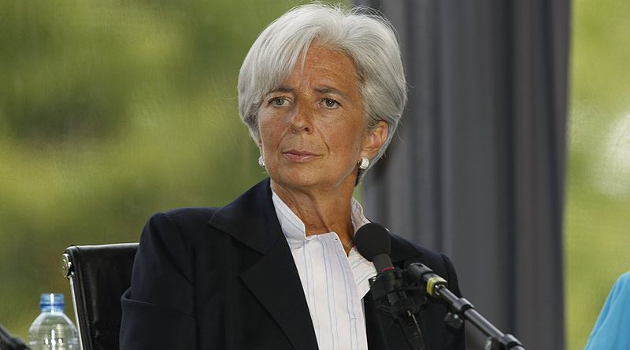It’s not easy to identify the worst international bureaucracy.
Some days, I’m tempted to pick the Organization for Economic Cooperation and Development.  After all, the Paris-based bureaucracy is infamous for pushing bigger government and higher taxes.
After all, the Paris-based bureaucracy is infamous for pushing bigger government and higher taxes.
Other days, I want to select the International Monetary Fund, which leverages its bailout authority to relentlessly coerce governments into imposing higher taxes to finance bigger budgets.
At least for today, I’m going to argue that the IMF wins the dubious prize of being the worst.
That’s because the bureaucracy is doubling down on its ideological zeal for bigger government. Here are some excerpts from a speech earlier this week by the organization’s top bureaucrat, Christine Lagarde (who, incidentally, receives a lavish tax-free salary).
Our issue today is international corporate taxation. …I believe we need new rules in this area. …reasons why a new approach
is urgent. …the three-decade long decline in corporate tax rates, undermines faith in the fairness of the overall tax system. …New IMF research published two weeks ago analyzes various options in…better addressing profit-shifting and tax competition.
Ms. Lagarde wants to boost the tax burden on business, and she complained about the fact that corporate tax rates have come down in recent decades.
What she cleverly didn’t acknowledge, though, is that the IMF’s own research shows that lower rates have not resulted in less revenue.
But you have to give Lagarde and her minions credit. They act on their beliefs.
The IMF has been pushing for big tax increases in Bahrain.
The International Monetary Fund (IMF) has called on the Bahrain government to take further action to shore up its shaky financial position, saying a large package of revenue and expenditure measures – including new taxes – is “urgently needed”.
…the IMF set out a number of policy ideas – including the controversial tax proposal – in a statement… Bikas Joshi, the official who led the IMF team that visited Bahrain…went on to say that a “large fiscal adjustment is a priority” for the country…he said. “The implementation of a value-added tax, as planned, would be important. Additional revenue measures—including consideration of a corporate income tax—would be welcome.”
The IMF has been warning against tax cuts and instead pushing for tax increases in Ireland.
The International Monetary Fund (IMF) has urged the Government not to cut taxes in the upcoming budget, warning it risked “over-stimulating” Ireland’s fast-growing economy.
…The fund recommended boosting housing supply through State-backed social housing projects… It recommended the Government pursues a small budget surplus in 2019… To achieve this, it advised broadening the tax base. One way this could be done was by increasing the tax on diesel… In addition, the IMF recommended getting rid of various tax exemptions and preferential rates such as the lower 9 per cent VAT rate for the hospitality sector.
The IMF has urged so many taxes that it created a backlash in Jordan.
Thousands of Jordanians heeded a strike call…to protest at major, IMF-guided tax rises they say will worsen an erosion in living standards. …warning the government that sweeping tax amendments…would impoverish employees
already hit by unprecedented tax hikes implemented earlier this year. …tens of thousands of public and private sector employees accused the government of caving in to International Monetary Fund (IMF) demands and squeezing a middle class… The amendments, which would double the income tax base, are a key condition of a three-year IMF economic program that aims to generate more state revenue… Jordan earlier…raised taxes on hundreds of food and consumer items.
The examples are part of a pattern. I’ve also written about the IMF pimping for higher taxes in big countries, in small countries, and even entire continents.
Needless to say, the IMF also agitates for tax increases in the United States.
And it’s even specifically targeted poor nations for tax increases! Maybe now you’ll understand why I joked about nations not allowing IMF bureaucrats to visit.
I want to close today’s column by returning to Lagarde’s speech because there was another part of her speech that belies belief. She actually wants people to think that higher taxes and bigger government are a recipe for more growth.
…the current situation is especially harmful to low-income countries, depriving them of much-needed revenue to help them achieve higher economic growth.
Yes, your eyes are not deceiving you. The IMF’s top bureaucrat made the absurdly anti-empirical argument that higher taxes are good for growth.
Even though that’s directly contrary to evidence on the factors that enabled North America and Western Europe to become rich.
Sadly, this is now a common rhetorical tactic by international bureaucracies. The OECD does the same thing, as does the United Nations.
I guess they all think if they repeat nonsense often enough, people will somehow conclude up is down and black is white.
For what it’s worth, I’ll wait for them to name a single country that ever became rich by imposing higher taxes and bigger government.
P.S. There are some good economists working in the research division of the IMF, and they periodically publish good research on topics such as spending caps, debt, decentralization, the size of government, demographics, government spending, and taxation. Too bad the bureaucrats working on policy never read those studies.
P.P.S. My favorite IMF study was the one that accidentally provided very compelling evidence against the value-added tax.
P.P.P.S. My least favorite IMF studies were the ones that actually suggested that it would be desirable if everyone had lower living standards so long as rich people disproportionately suffered. Disgusting.
———
Image credit: MEDEF | CC BY-SA 2.0.

